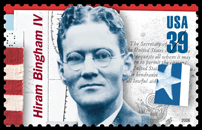1903 - 1988

On May 30, 2006 the US Postal Service issued a stamp to commemorate the life of this unsung World War II hero. Few people have any knowledge of the extraordinary activities Hiram (Harry) Bingham accomplished during his years in the diplomatic service. Recently his son Robert Kim Bingham has written a book entitled “Courageous Dissent” which tells how Hiram was able to save people’s lives while stationed as a U.S. vice consul in Marseilles, France, from 1939 to 1941.
Harry Bingham came from an illustrious family. His father (on whom the fictional character Indiana Jones was based) was the archeologist who unearthed the Inca City of Machu Picchu, Peru, in 1911. His father was also a US Senator and Governor of Connecticut. His great-grandfather Hiram Bingham I and grandfather Hiram Bingham II were the first missionaries to the Kingdom of Hawai'i. Bingham attended the prestigious Groton School and graduated from Yale University in 1925.
Harry entered the US diplomatic service upon graduation and at the beginning of Hitler’s invasion of Europe was working in France. The USA was then neutral and President Roosevelt not wishing to annoy Marshal Petain's puppet Vichy regime ordered its representatives in Marseilles not to grant visas to any Jews. Harry Bingham found this order to be immoral and, risking his career, did all in his power to undermine this policy.
In defiance of his bosses in Washington, he granted over 2,500 USA visas to Jewish and other refugees, including the artists Marc Chagall and Max Ernst and the family of the writer Thomas Mann. He also sheltered Jews in his Marseilles home, and obtained forged identity papers to help Jews in their dangerous journeys across Europe. He worked with the French underground to smuggle Jews out of France into Franco's Spain or across the Mediterranean and even contributed to their expenses out of his own pocket.
In 1941 Washington lost patience with him. Harry Bingham was sent to Argentina, where later he continued to annoy his superiors by reporting on the movements of Nazi war criminals. In 1945, he was forced to retire from the United States Foreign Service.
Bingham did not speak much about his wartime activities. His own family had little knowledge of them until after Bingham's death when his youngest son discovered a tightly wrapped bundle of letters, documents, and photographs in a cupboard behind a chimney in the family’s home. The bundle told of Bingham's struggle to save German and Jewish refugees from death, details long hidden by the United States government.
On June 27, 2002, U.S. Secretary of State Colin Powell praised Bingham’s "constructive dissent" and presented a posthumous "courageous diplomat" award to his children at an American Foreign Service Officers Association awards ceremony. His sixth son, Robert, launched a stamp drive in 1998 to urge the US Postal Service to issue a postage stamp in honor of his father. The campaign gained wide bipartisan support in the US Congress and, after six years, the postage stamp was finally issued.
Harry Bingham IV died almost penniless in Salem, Connecticut at the age of 84. He left behind Rose, his wife for 53 years, and 11 children who now remember their father as a WWII hero.
